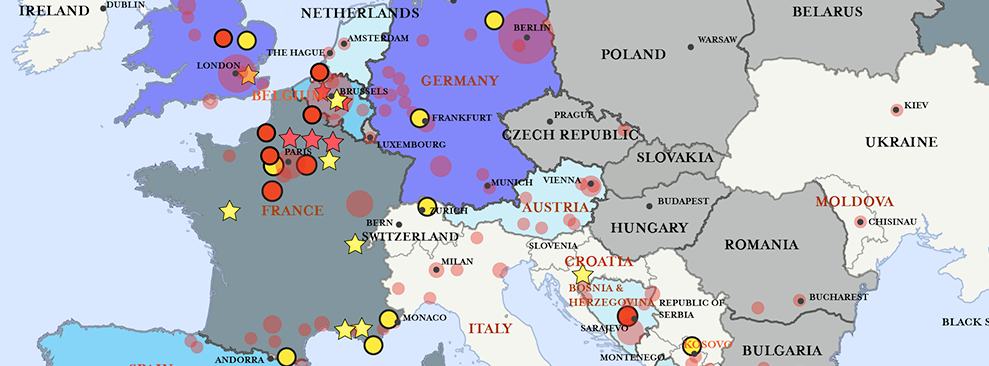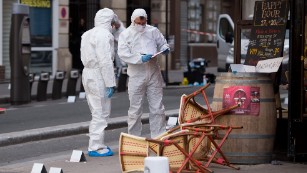Progress Since Prague
The Obama Administration’s focus on nuclear security is part of a comprehensive nuclear policy presented by the President in Prague in 2009. In that speech, President Obama described a four-pronged agenda to pursue a world without nuclear weapons. He laid out new U.S. policies and initiatives towards nuclear disarmament, nuclear nonproliferation, nuclear security, and nuclear energy.
President Obama in his Prague remarks identified the risk of nuclear terrorism as the most immediate and extreme threat to global security, and he called for a worldwide effort to secure all vulnerable nuclear materials in four years. He also highlighted the need to break up black markets, detect and intercept materials in transit, and use financial tools to disrupt illicit trade in nuclear materials.
The Nuclear Threat
It is almost impossible to quantify the likelihood of nuclear attack by extremist groups. But we know that roughly 2000 metric tons of nuclear weapons usable materials — highly enriched uranium and separated plutonium — are present in both civilian and military programs, and we know that terrorists have the intent and the capability to turn these raw materials into a nuclear device if they were to gain access to them. A terrorist attack with an improvised nuclear device would create political, economic, social, psychological, and environmental havoc around the world, no matter where the attack occurs. The threat is global, the impact of a nuclear terrorist attack would be global, and the solutions therefore must be global.
The President’s call-to-action in Prague was intended to reinvigorate existing bilateral and multilateral efforts and to challenge nations to re-examine their own commitments to nuclear security. Given the global repercussions of such an attack, all nations have a common interest in establishing the highest levels of security and protection over nuclear material and strengthening national and international efforts to prevent nuclear smuggling and detect and intercept nuclear materials in transit. World leaders have no greater responsibility than ensuring their people and neighboring countries are safe by securing nuclear materials and preventing nuclear terrorism.
Nuclear Security Summit Successes
The Nuclear Security Summit process has been the centerpiece of these efforts. Since the first Summit in April 2010 in Washington, DC, President Obama and more than 50 world leaders have been working together to prevent nuclear terrorism and counter nuclear smuggling. This Summit community has built an impressive track record in meaningful progress towards nuclear security, and on actions that back up our words. Collectively, Summit participants have made over 260 national security commitments in the first three Summits, and of these, nearly three-quarters have been implemented. These outcomes – nuclear material removed or eliminated, treaties ratified and implemented, reactors converted, regulations strengthened, “Centers of Excellence” launched, technologies upgraded, capabilities enhanced – are tangible, concrete evidence of improved nuclear security. The international community has made it harder than ever for terrorists to acquire nuclear weapons, and that has made us all more secure.
In addition to national actions, Summits have provided opportunities for countries to step beyond the limitations of consensus to highlight steps they are actually taking as a group to reduce nuclear threats. These so-called “gift baskets” have reflected joint commitments related to countering nuclear smuggling, radioactive source security, information security, transportation security, and many other topics. It would be an overstatement to suggest that these national and collective commitments have come about exclusively as a result of the Nuclear Security Summits, but it is fair to say that they would almost certainly not all have transpired in the absence of the kind of high-level forcing effect that summits can have.
Across the four Nuclear Security Summits, we have maintained the momentum of tangible actions to reduce the threat of nuclear terrorism and to make progress towards strengthened international norms and standards for nuclear security.
- The number of facilities with nuclear material continues to decline: We successfully completed removals or confirmed the downblending of highly enriched uranium (HEU) and plutonium from more than 50 facilities in 30 countries — in total, enough material for 130 nuclear weapons.
- In 2010, Ukraine committed to remove four bombs’ worth of HEU and completed that removal in 2012, fully eliminating all HEU from its territory – a particularly vital step in light of Russia’s subsequent breaches of Ukraine’s sovereignty and territorial integrity.
- Japan is on track to remove over 500 kilograms of HEU and separated plutonium from its Fast Critical Assembly. This is the largest-ever project by a country to remove nuclear material from its territory and we look forward to continued work with Japan on additional removals.
- Fourteen countries and Taiwan highlighted the elimination of all nuclear materials from their territory; as a result, wide swaths of Central and Eastern Europe and all of South America can be considered free of HEU and therefore no longer targets for those seeking nuclear materials.
- Security at sites and on borders is increasing: All Summit countries reported progress in enhancing nuclear security practices, including 20 countries committing to increase cooperation to counter nuclear smuggling efforts, and 13 countries pledging to improve nuclear detection practices at ports;
- A majority of Summit states will implement stronger security practices: 36 countries pledged to implement stronger nuclear security practices in their countries by – among other things – incorporating international guidelines into national laws, inviting international peer reviews of their nuclear material, and committing to continuous review and improvement of their nuclear security systems.
- The legal basis for nuclear security continues to be strengthened: additional countries are adopting binding legal commitments, such as the Amended Convention on the Physical Protection of Nuclear Material, which will soon achieve entry into force with over 80 new ratifications since 2009, and the International Convention on Suppression of Acts of Nuclear Terrorism.
- Nuclear Security Training and Support Centers and other nuclear security Centers of Excellence have increased and become more connected: 15 states have opened centers since 2009 in support of national nuclear workforce training requirements, as well as international capacity building and research and development on nuclear security technologies.
- Radioactive source security has been enhanced: 23 countries agreed to secure their most dangerous radioactive sources to levels established in international guidelines by 2016.
Strengthening the Architecture
Key aspects of the Summits’ success have included the personal attention of national leaders; a focus on tangible, meaningful outcomes; a regular event that elicits deliverables and announcements; and a forum that builds relationships that can help advance joint efforts. We need to find ways to capture some of these attributes in more lasting vehicles to promote nuclear security progress.
The IAEA’s first-ever nuclear security ministerial held in 2013 is an important step towards strengthening the Agency’s role in promoting nuclear security, and we look forward to regularizing those high-level meetings, with the next one being held in December 2016. The 2012 special session at the UN on nuclear terrorism reflects the unique convening power of the United Nations in this arena. INTERPOL plays a unique role in bringing together law enforcement officials, as seen through its recent convening of the recent Global Conference to combat nuclear smuggling. Other fora for collective action – the Global Partnership, the Global Initiative to Combat Nuclear Terrorism (GICNT), the Nuclear Suppliers Group – have all been invigorated in recent years. The United States hosted the first Nuclear Security Regulators Conference in 2012, and Spain will host the second such meeting in May 2016. The World Institute for Nuclear Security, professional societies and nongovernmental expert communities are also key components of this architecture and must continue to contribute to this mission as we move beyond Summits to nurture new concepts, build professional skills, and develop global connections.
The Summits were designed to enhance, elevate, expand and empower this architecture of treaties, institutions, norms and practices to effectively address the threats we face today and in the future. As the 2016 Nuclear Security Summit represents the last summit in this format, we will issue five Action Plans in support of the key enduring institutions and initiatives related to nuclear security: the UN, the IAEA, INTERPOL, the GICNT and the Global Partnership. These Action Plans represent steps the Summit participants will take as members of these organizations to support their enhanced role in nuclear security.
Another key component of the Summit’s success has been the effective network of “Sherpas” – the senior expert officials in each Summit country responsible for developing the outcomes of the Summits and for preparing their respective leaders. These Sherpas cut across multiple agencies to form a tight-knit community of action. This community will be carried forward after the 2016 Summit as a “Nuclear Security Contact Group” that will meet regularly to synchronize efforts to implement commitments made in the four Summit Communiqués, national statements, gift baskets, and Action Plans. Recognizing the interest from those who have not been part of the Summit process, this Contact Group will be open to countries that wish to promote the Summit agenda.
Looking Ahead
As much as we have accomplished through the Summit process, more work remains. We will continue to seek additional tangible results in nuclear material reductions and better overall nuclear and radiological security practices; we will look for ways to enhance the global nuclear security architecture; and, we will continue to promote an architecture that – over time – is comprehensive in its scope (including civilian and military material), is based on international standards, incorporates measures to build confidence that states are applying security responsibly in their countries, and promotes declining stocks of directly useable fissile material.
We all need to do more together to enhance nuclear security performance, to dissuade and apprehend nuclear traffickers, to eliminate excess nuclear weapons and material, to avoid production of materials we cannot use, to make sure our facilities can repel the full range of threats we have already seen in our neighborhoods, to share experiences and best practices, and to do so in ways that are visible to friends, neighbors, and rivals – and thereby provide assurance that we are effectively executing our sovereign responsibility. We also need to reflect the principle of continuous improvement, because nuclear security is never “done”. As long as materials exist, they require our utmost commitment to their protection—we continue the march toward the goal of a world without nuclear weapons.



